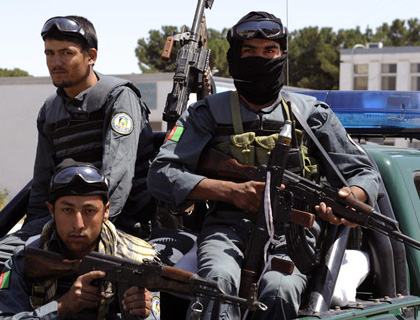KABUL - Western officials are not setting the bar very high for Afghan diplomats who will meet regional counterparts in Istanbul this week, the first of two conferences that will go a long way to shaping the future of international involvement in Afghanistan.
The government and its foreign backers are preparing for the end of 2014, the deadline for foreign combat troops to return home, even though some foreign troops will remain as trainers and advisers.
Some Afghans fear their own security forces will be unable to cope with the insurgency when the majority of foreign troops go and that their country may fall into another civil war.
Wednesday's Turkish session is meant to agree on a framework for regional security and cooperation, including Afghan border nations Pakistan, Iran, China, Turkmenistan, Tajikistan and Uzbekistan, ahead of a wider-ranging meeting in Germany in December. Some participants already have low expectations.
"If they agree on the roadmap leading towards a meaningful regional security dialogue and application of security-building measures on a regional level, that will be a success by itself," a senior Western official said.
"(There are) low expectations, but if they launch the process, in that respect it will be a success."
Afghanistan, which argues that militancy and drug trafficking are cross-border problems that need cross-border solutions, wanted legally binding security commitments to be made in Istanbul. Kabul has since had to concede that only a non-binding, watered-down agreement will be possible.
"Regional cooperation is crucial not just for achieving long-desired security, stability and prosperity for the people of Afghanistan ... but also in the wider region," said Afghan deputy foreign minister Jawed Ludin, addressing diplomats before closed-door talks in the run-up to the Istanbul meeting.
Regional heavyweight Pakistan would be crucial to any cross-border security initiative but it is also harboring modest ambitions.
"We envisage this conference as a platform to express the region's solidarity and support for Afghanistan in its endeavors to establish peace and stability," Pakistani foreign ministry spokeswoman Tehmina Janjua said in a weekly briefing.
The Pentagon says insurgents abetted by Pakistan pose the major threat to U.S.-led forces in Afghanistan, and that several recent high-profile attacks in Kabul were carried out by the al Qaeda-linked Haqqani network, which is based in both eastern Afghanistan and Pakistan.
Such threats were underscored yet again on Saturday, when a suicide bomber killed 13 troops and civilian employees from the NATO-led force, as well as four Afghans, in Kabul in the deadliest single ground attack against the coalition in 10 years of war.
The often tense relationship between Washington and Islamabad aside, platitudes from Pakistan about Wednesday's meeting will not change the situation in Afghanistan.
"The Afghans have had to lower their ambitions a bit in the face of some regional objections," a second senior Western official said.
Rather than aim high and fail, those involved in the talks have settled for modest goals that are easier to reach.
"The idea is to leave a senior level group which would meet in a few months and start applying some of the confidence-building measures," the first Western official said.
"It's going to be very difficult because of the very different and conflicting agendas of regional players."
After Istanbul will come the Bonn conference, a December gathering at which donor countries hope to agree on what their commitments will be beyond the end of 2014.
"It's going to be a long-term process," Afghanistan's Ludin said. "We are not going to achieve the aims we all aspire to in one conference alone." (Reuters)

